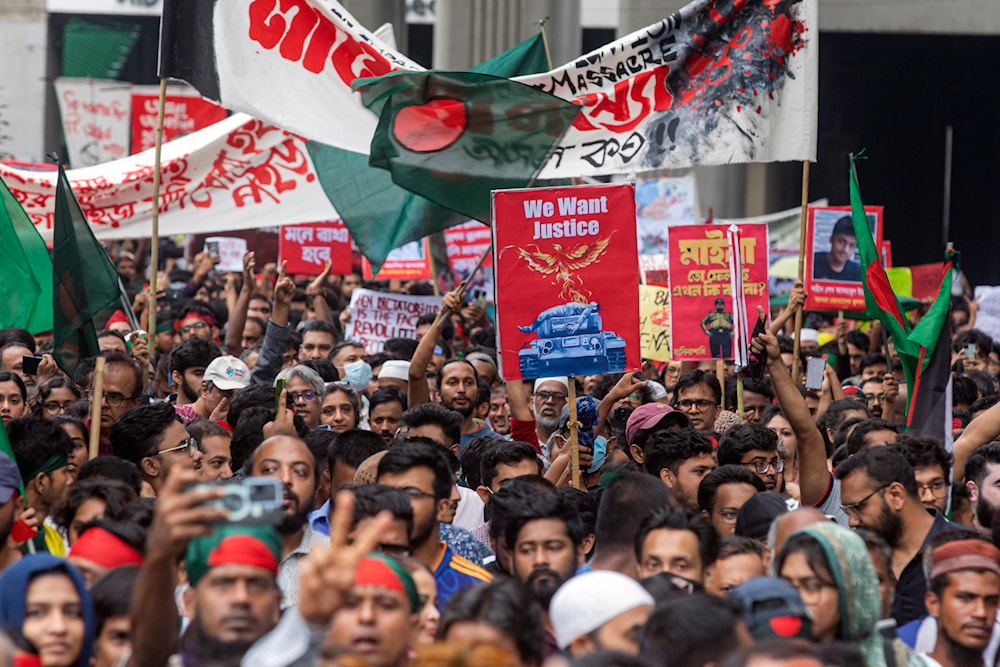Students in Bangladesh mobilizing to call on Sheikh Hasina to resign
Students want Hasina to issue a public apology for the violence that occurred last month and for firing some of her ministers.
-

Activists take part in a protest march against Prime Minister Sheikh Hasina and her government in Dhaka, Bangladesh, Friday, Aug. 2, 2024. (AP)
Student leaders mobilized Bangladeshis on Saturday for a statewide campaign of civil disobedience as Prime Minister Sheikh Hasina's administration dealt with an increasingly severe backlash following a deadly police crackdown on protesters.
Last month, protests over civil service employment quotas set off days of chaos that resulted in over 200 fatalities—some of the deadliest turmoil in Hasina's 15-year presidency.
Order was momentarily restored by the deployment of troops, but after the Friday prayers in the country with a majority of Muslims, large crowds took to the streets in response to a request by student groups to pressure the government into making further concessions.
The organization behind the first protests, Students Against Discrimination, encouraged its fellow citizens to begin a full-scale campaign of non-cooperation on Sunday.
The group's Asif Mahmud relayed to AFP, "This includes non-payment of taxes and utility bills, strikes by government workers and a halt to overseas remittance payments through banks," adding on Facebook, "Please don't stay at home. Join your nearest protest march."
Students want Hasina to issue a public apology for the violence that occurred last month and for firing some of her ministers.
Additionally, they have demanded that the government reopen the nation's colleges and universities, all of which were closed during the height of the upheaval. Chants from the street crowd called for Hasina's resignation.
Read more: Student protests hit Bangladesh economy with $10B loss: Chamber
'Forced to fire'
Several foreign governments denounced the crackdown, and last week Josep Borrell, the head of EU foreign policy, called for an international investigation into the use of "excessive and lethal force against protesters."
Asaduzzaman Khan, the home minister, informed reporters over the weekend that although security officers had behaved responsibly, they had been "forced to open fire" in order to protect government buildings.
According to the UN, among those slain last month were at least 32 children.
Student protests against civil service job quotas led to severe unrest last month, resulting in at least 206 deaths, according to AFP's tally from police and hospital reports. This violence marked some of the most intense turmoil during Prime Minister Sheikh Hasina's 15-year rule, prompting significant domestic dissatisfaction and international condemnation.
Prime Minister Sheikh Hasina, 76, has been in power since 2009 and secured her fourth consecutive term in January following an election widely criticized for lacking genuine opposition. Her administration faces allegations from human rights groups of manipulating state institutions to consolidate power and suppress dissent, including accusations of extrajudicial killings of opposition activists.
The protests began in early July in response to the reinstatement of a quota system for government jobs, which was later reduced by the Supreme Court. This system, which allocated more than half of all government positions to specific groups, stirred frustration among graduates amid a severe employment crisis affecting around 18 million young Bangladeshis. Critics argue that the quota was used to fill public positions with loyalists of the ruling Awami League.
The protests last month had been largely peaceful until police and pro-government student groups attacked demonstrators. In response, Prime Minister Sheikh Hasina's government imposed a nationwide curfew, deployed troops, and shut down the mobile internet network for 11 days to restore order.

 3 Min Read
3 Min Read








